Well, it had to happen eventually. In order to escape bankruptcy, Caesars Entertainment is putting Caesars Entertainment 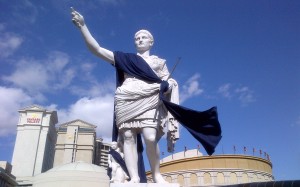 Operating Co. on the market. There are some who are calling this a bluff and others who can’t afford to get in on the once-in-a-lifetime offer. Everybody else, get out your charge card and prepare to drain your revolving line of credit to the dregs. Offers like this don’t come along every day, let alone any year.
Operating Co. on the market. There are some who are calling this a bluff and others who can’t afford to get in on the once-in-a-lifetime offer. Everybody else, get out your charge card and prepare to drain your revolving line of credit to the dregs. Offers like this don’t come along every day, let alone any year.
According to Caesars spokesman Gary Thompson, the contents of CEOC are “Caesars Palace [minus the Octavius Tower — that could be awkward], Caesars Atlantic City, Harrah’s Reno, 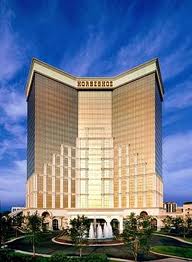 Harrah’s Tahoe, Harrah’s Joliet, Harrah’s Gulf Coast, Harrah’s Council Bluffs, Harrah’s North Kansas City, Horseshoe Southern Indiana, Horseshoe Council Bluffs, Horseshoe Hammond, Horseshoe Bossier City, Horseshoe Tunica, Louisiana Downs, Bally’s Atlantic City, Harvey’s Lake Tahoe and our international properties [including London Clubs]. It also manages three tribal-owned casinos – Harrah’s Ak-Chin, Harrah’s Southern California and Harrah’s Cherokee – and Caesars Windsor (owned by the Ontario Lottery),” plus holds the management contracts for Horseshoe Cleveland and Horseshoe Cincinnati. That’s one heckuva lotta casinos.
Harrah’s Tahoe, Harrah’s Joliet, Harrah’s Gulf Coast, Harrah’s Council Bluffs, Harrah’s North Kansas City, Horseshoe Southern Indiana, Horseshoe Council Bluffs, Horseshoe Hammond, Horseshoe Bossier City, Horseshoe Tunica, Louisiana Downs, Bally’s Atlantic City, Harvey’s Lake Tahoe and our international properties [including London Clubs]. It also manages three tribal-owned casinos – Harrah’s Ak-Chin, Harrah’s Southern California and Harrah’s Cherokee – and Caesars Windsor (owned by the Ontario Lottery),” plus holds the management contracts for Horseshoe Cleveland and Horseshoe Cincinnati. That’s one heckuva lotta casinos.
A big disincentive to any bidder is that you’re taking on the Caesars empire without Total Rewards, which is sheltered under the (solvent) parent company. So you’d be building your loyalty 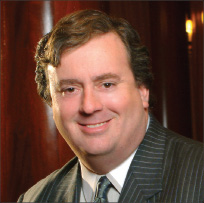 database from scratch. As Reuters explains it, “Under a complex operating structure, CEOC owns Total Rewards. But a separate, non-bankrupt unit called Caesars Enterprise Services controls the licensing agreement that channels business between casinos putting that piece of the program out of reach of bidders for the casino operating unit.” Bidders will also have to pick their way through an Enron-like thicket of 170 different Caesars-owned entities that Texas Pacific Group and Apollo Management set up.
database from scratch. As Reuters explains it, “Under a complex operating structure, CEOC owns Total Rewards. But a separate, non-bankrupt unit called Caesars Enterprise Services controls the licensing agreement that channels business between casinos putting that piece of the program out of reach of bidders for the casino operating unit.” Bidders will also have to pick their way through an Enron-like thicket of 170 different Caesars-owned entities that Texas Pacific Group and Apollo Management set up.
So the whole thing may be a bluff. Or, as Caesars puts it “there is no guarantee that the transaction will close.” As Fitch Ratings analyst Alex Bumazhny says, “It’s difficult to imagine a third party 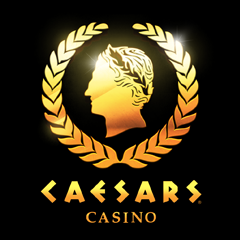 coming along and bidding for the assets without Total Rewards.” Another disincentive is that the Las Vegas Strip assets — the Total Rewards carrot — aren’t on the sale block. Of the potential bidders, MGM Resorts International is already heavily leveraged, Wynn Resorts is too upmarket and averse to debt, and Boyd Gaming just plain might not be able to afford such a large deal. That leaves Gaming & Leisure Properties — which could walk into a thicket of anti-trust issues — and former Caesars suitor Penn National Gaming, of whom similar things might be said.
coming along and bidding for the assets without Total Rewards.” Another disincentive is that the Las Vegas Strip assets — the Total Rewards carrot — aren’t on the sale block. Of the potential bidders, MGM Resorts International is already heavily leveraged, Wynn Resorts is too upmarket and averse to debt, and Boyd Gaming just plain might not be able to afford such a large deal. That leaves Gaming & Leisure Properties — which could walk into a thicket of anti-trust issues — and former Caesars suitor Penn National Gaming, of whom similar things might be said.
Also, the timing is about seven years too late. The moment to divest would have been right after the LBO, when casino values were at their peak. Between the bursting of the casino bubble and deferred maintenance throughout the Caesars corporation, those dozens of properties probably don’t look as attractive as they did in 2007-08. Junior and unsecured creditors are already hopping mad about the sale, with the latter stating that “without prime assets, the proposed sale will fail to draw the best price possible for the bankrupt unit’s estate.” Besides, if you sever the Caesars tree from its regional roots, how will the Strip assets fare?
* If the Macao government had hoped to muzzle casino owners with its recent dressing-down, it has failed. Sociedade de Jogos  de Macau Executive Director Angela Leong has added her voice to the growing chorus of discontent (Sheldon Adelson being a notable non-participant) over economic policy in China. Calling for “concrete actions” to prop up the Macanese economy, Leong said sharply, “Macao is such a small place and the government wants to diversify the economy. But they only talk” rather than providing actual support.
de Macau Executive Director Angela Leong has added her voice to the growing chorus of discontent (Sheldon Adelson being a notable non-participant) over economic policy in China. Calling for “concrete actions” to prop up the Macanese economy, Leong said sharply, “Macao is such a small place and the government wants to diversify the economy. But they only talk” rather than providing actual support.
At present, Macao can only cling to vague promises of late-year action, made by Li Gang, the local emissary from Peking. With 20 casinos and 5,800 gaming tables, SJM is particularly exposed to the 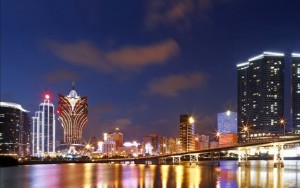 recession in gambling activity. Leong points the finger of blame right back at the government and its tardy delivery of the infrastructure that would facilitate mass-market gamblers. “Do you know how long we have been talking about the bridge” to Hong Kong, she asks. “Ten, 20 years. That’s a long time.” Macao’s glacial timeline for approving new projects also chafes Leong, who complains to Bloomberg Business about the six-year wait she’s endured for permission to build an amusement park on the Cotai Strip. (So much for government-mandated diversification.)
recession in gambling activity. Leong points the finger of blame right back at the government and its tardy delivery of the infrastructure that would facilitate mass-market gamblers. “Do you know how long we have been talking about the bridge” to Hong Kong, she asks. “Ten, 20 years. That’s a long time.” Macao’s glacial timeline for approving new projects also chafes Leong, who complains to Bloomberg Business about the six-year wait she’s endured for permission to build an amusement park on the Cotai Strip. (So much for government-mandated diversification.)
As he prepared to open Studio City Macau, co-chairman Lawrence Ho put the best face he could on his forced reliance on mass-market play, saying, “This is the future of China. The rise 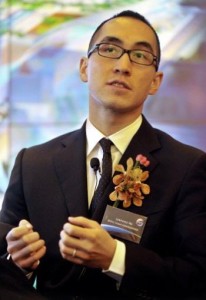 of the middle-income earning bracket and the rise of the more sophisticated well-travelled customer.” He’s given up on the VIP segment for Studio City, dedicating all 200 0f its tables to mass-market play.
of the middle-income earning bracket and the rise of the more sophisticated well-travelled customer.” He’s given up on the VIP segment for Studio City, dedicating all 200 0f its tables to mass-market play.
Tighter governmental scrutiny may not be the only thing chasing VIPs away from Macao. Pacific Financial Services founder Tony Tong theorizes that a Macao fatigue has set in and other Pacific Rim casinos, from Vladivostok to the Philippines are drawing off high rollers. They’re certainly subject to less government-imposed pressure there than back at home.


I have a qualified buyer for these properties. The problem is Caesars and their creditors think they are worth more than they truly are.